

The peanut farmer from Plains




The peanut farmer from Plains

President Jimmy Carter, also known as the peanut man, passed away Dec. 29, 2024, at his home in Plains, Georgia.
A fall peanut harvest tour in Georgia helps educate chefs and food influencers more about peanuts.
U.S. Peanut Federation representatives met with elected officials regarding economic assistance and the farm bill.
24
The National Peanut Board elected 2025 officers at its December meeting.
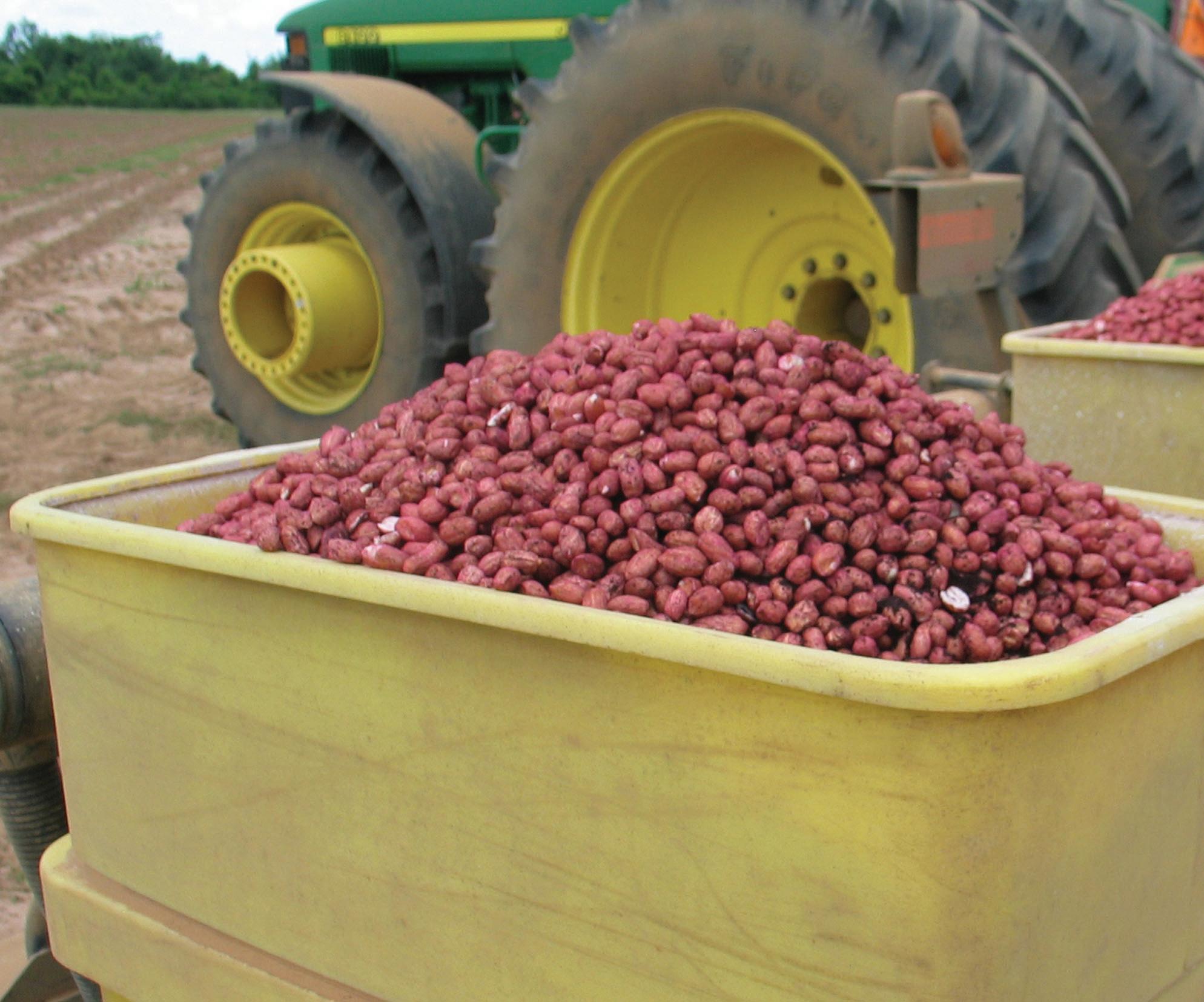

Selecting a variety is a key management step for farmers. SEPF’s 2025 Variety Guidebook highlights varieties available to growers in the Southeast and provides growers with the results of state variety tests. 6
A military honor guard carries the casket of former President Jimmy Carter out of his home church, Maranatha Baptist Church, in Plains, Ga., following his final funeral Thursday, Jan. 9, 2025. Photo by Joy Crosby.

Southeastern Peanut Farmer is published six times a year (Jan./Feb., March, April, May/June, July/Aug., and Oct./Nov.) by the Southern Peanut Farmers Federation. The publisher is not responsible for copy omission, typographical errors, or any unintentional errors that may occur, other than to correct it in the following issue. Any erroneous reflection which may occur in the columns of Southeastern Peanut Farmer will be corrected upon brought to the attention of the editor. (Phone 229-386-3690.) Postmaster: Send address changes (Form 3579) to Southeastern Peanut Farmer, P.O. Box 706, Tifton, Georgia, 31793.
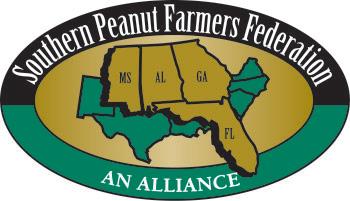
The end of a year and beginning of a new year brings about a time of reflection for me and most likely others too. This year, I had time to reflect while attending two funerals of individuals who reached a milestone of 100 years. One of the individuals, St. Elmo Harrison, passed away 15 days shy of his 102nd birthday.
Both funerals were of men from small towns, who were raised on a family farm and served in the Navy. However, one remained a farmer in the small town of Whigham, Georgia. The other man served our country as the 39th President of the United States and returned home to his small town of Plains, Georgia.
There are similarities and differences between St. Elmo Harrison and President Jimmy Carter, but at the end of the day, they had peanuts in common. Peanuts are known to bring individuals together through hard work, educational experiences and even fun events.
Even though both men were born in small towns their livelihoods continued in vastly different pathways. However, love for their small hometown and agriculture kept them at home and returning to their hometown.
At Harrison’s funeral I sat and listened to stories from the preacher and family about St. Elmo’s laugh, hard work and grit. At the end of the funeral, a video, made by St. Elmo’s granddaughter, was shared with attendees. One item noticeable throughout the video was St. Elmo always giving a thumbs up whenever there was a photo of him in the field or in his tractor. It was evident from the video that St. Elmo loved to laugh, and he loved farming. One time while shooting a video with St. Elmo, I asked him why he loved farming and he simply said, "It's in my blood."
At President Carter’s funeral, I stood outside the church in Plains, Georgia, with media reporters and photographers from across the state and nation. Throughout the day, we watched as buses began unloading family and friends at 1:00 p.m. for the private funeral scheduled at 5:00 p.m. One little girl caught my eye. She carried a feather and had a tear in her eye walking into the church with her mom and siblings. She appeared to be about 4 years old. I wonder if she even realized the magnitude of the funeral she was attending and the story she will be able to tell future generations.
I feel very fortunate that I was able to attend both funerals and have had the opportunity to know St. Elmo Harrison and President Jimmy Carter through my role in the peanut industry. As I think back about both funerals, it is clear St. Elmo and President Carter both had a heart for agriculture and their small towns of Whigham and Plains, respectively.

Joy Carter Crosby SEPF Editor
Florida Peanut Producers Association
Annual Meeting
Feb. 27, 2025, Jackson County Agricultural Complex and Conference Center, Marianna, Fla. For more information visit flpeanuts.com.
American Peanut Shellers Association
Industry Spring Conference
March 11-12, 2025, Albany, Ga. For more information visit peanut-shellers.org.
Farm Stress Summit
March 13, 2025, Statesboro, Ga. For more information visit extension.uga.edu/topicareas/timely-topics/Rural/farm-stressconference.html.
National Ag Day
March 18, 2025. For more information visit agday.org.
Peanut Proud Festival
March 22, 2025, Blakely, Ga. For more info visit www.peanutproudfestival.com.
International Peanut Forum
April 9-11, 2025, Seville, Spain. For more info visit peanutsusa.com.
USA Peanut Congress
June 9-12, 2025, Nashville, Tenn. For more information call 229-888-2508 or visit peanut-shellers.org.
American Peanut Research and Educational Society
July 15-17, 2025, Richmond, Va. For more info visit apresinc.com.
Southern Peanut Growers
July 23-25, 2025, Edgewater Beach Resort, Panama City Beach, Fla. For more info visit southernpeanutfarmers.org.
Sunbelt Ag Expo
Oct. 14-16, 2025, Moultrie, Ga. For more info visit sunbeltexpo.com.
American Peanut Council's Insights Summit
Dec. 10-11, 2025, Washington, D.C. For more info visit peanutsusa.com.
Let us know about your event. Please send details to the editor at joycrosby@gapeanuts.com.
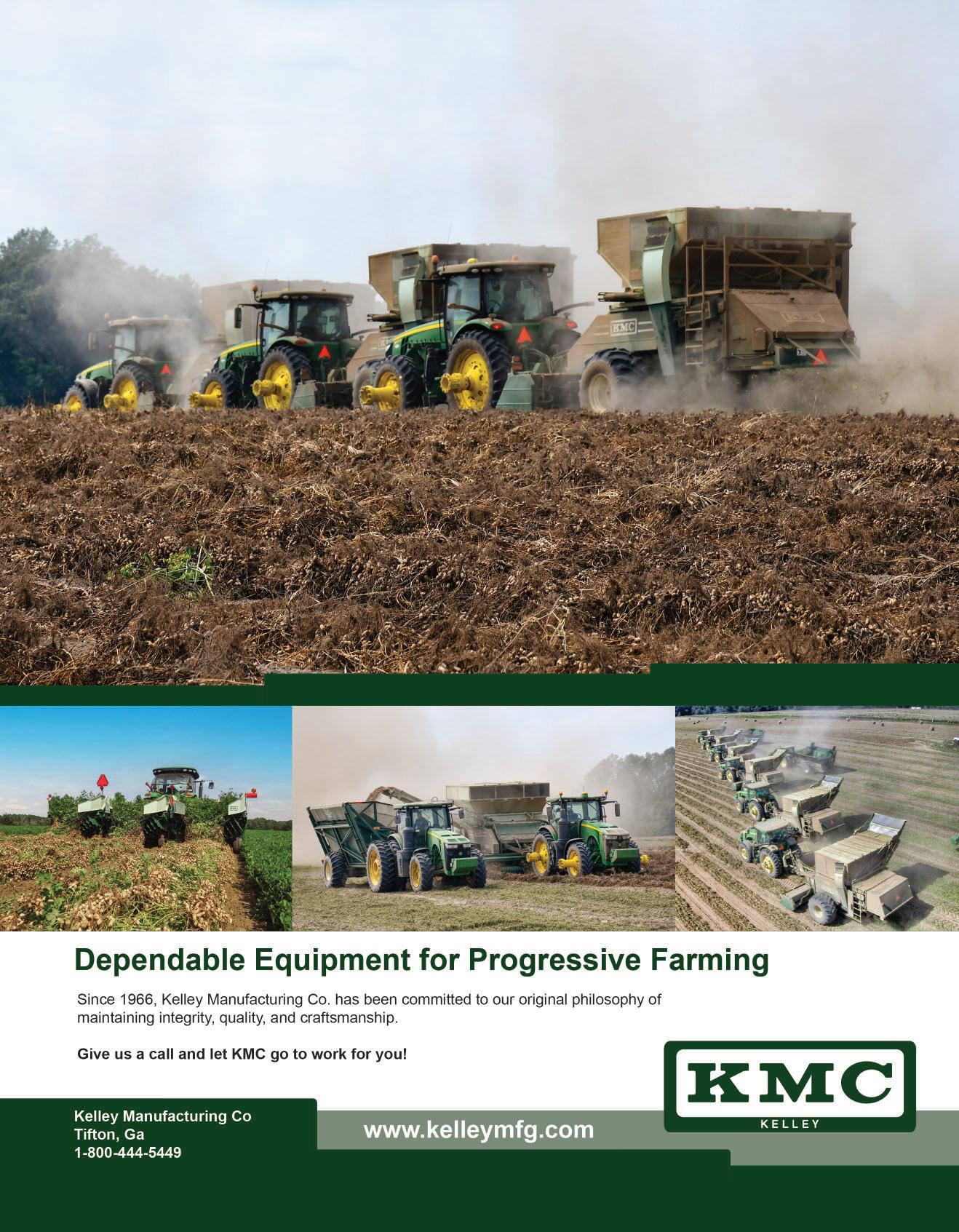
by Joy Crosby
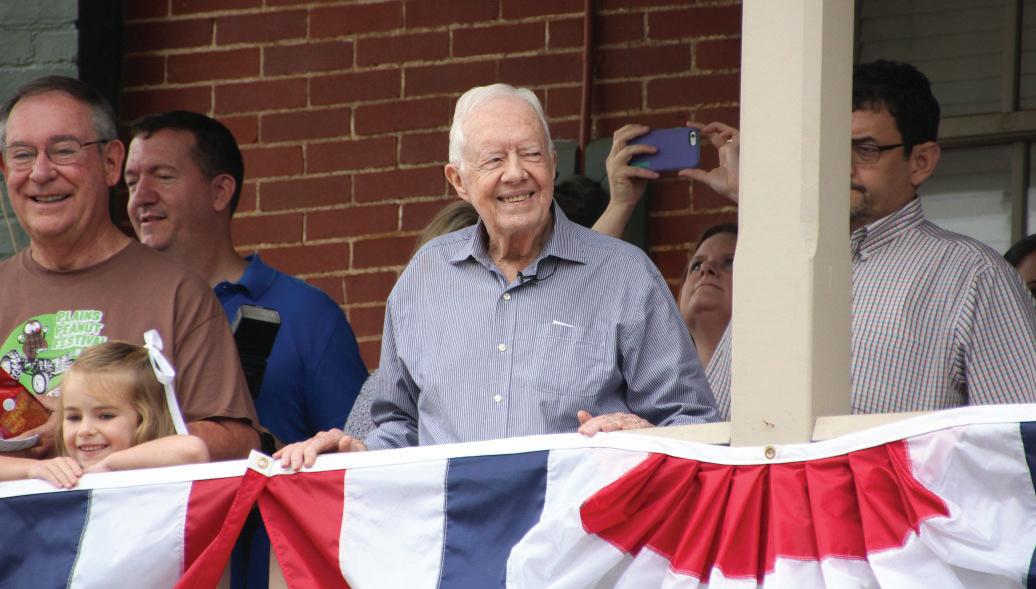
In the quiet town of Plains, Georgia, Jimmy Carter was born Oct. 1, 1924. From the beginning, his life was deeply rooted in the red soil of the South and the close-knit community of this small town. Plains, with its population of a few hundred people, was a place where everyone knew each other. It shaped Carter’s character, instilling values of hard work, humility, and a deep sense of faith.
Carter grew up on his family’s peanut farm, learning the value of labor early in life. His father, Earl Carter, was a farmer and businessman, while his mother, Lillian, was a nurse who was known for her compassion. The farm was modest, and Carter often spent his days tending to crops or helping with chores.
As a youngster, Carter pulled up green peanuts, boiled them and walked or rode his bicycle to Plains to sell the delicacy for $.05 per bag.
After graduating from Plains High School in 1941, he left his hometown for the U.S. Naval Academy in Annapolis, Maryland. Carter served in the Navy for several years, eventually returning to Plains in the early 1950s after his father's death to take over the family farm which later turned into the Carter Peanut Seed business. Under his management, the peanut business thrived, and Carter became an active member of the community, serving on local boards and supporting civic projects.
According to Tyron Spearman, executive director of the National Peanut Buying Points Association,
Carter organized the Warehouseman's Association.
"To maintain seed quality, he organized the Southern Peanut Warehousemen's Association to urge seed companies to protect seed until the next growing season," Spearman says.
“I was always known as a peanut
man. I
looked on that with a great source of pride because I don't think there's any food or any crop that's more significant to more people in the world than peanuts have been or will be in the future."
President Jimmy Carter
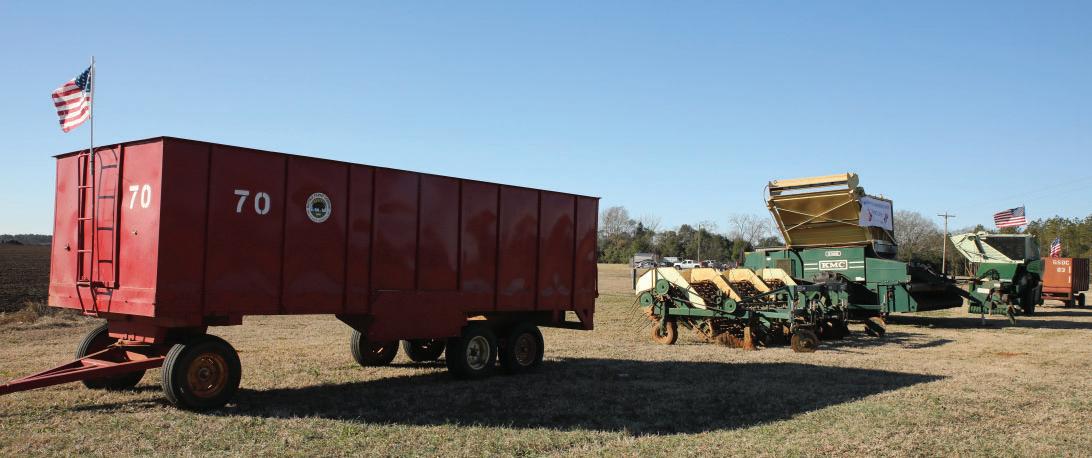
Through the years, President Carter assisted the peanut industry many times through interviews on behalf of peanuts, hosted export visitors, spoke multiple times to attendees on the Georgia Peanut Tour and hosted attendees during the Plains Peanut Festival.
The Plains Peanut Festival is an annual event that draws thousands of visitors to the small town. John Powell, former executive director of the American Peanut Shellers Association, worked for many years with the Carter family and citizens in Plains by helping plan and host the annual festival.
Through Powell's years of travel, he was often asked about President Carter.
"He was certainly the most famous peanut farmer in all of the world. Through my travels, I've been asked many times if I know Jimmy Carter and
I've always been proud to say, I do."
President Carter was also instrumental in helping the peanut industry get peanuts back on Delta airlines years ago. One time, Powell recalls, Delta Airlines removed peanuts from their flights due to allergy concerns. President Carter heard about it, called the CEO, and peanuts were added back to flights soon after.
It was in Plains that Carter's political journey began which eventually led to becoming the 39th President of the United States. As president, Carter was always known as the peanut man.
"I was always known as a peanut man," says President Carter. "I looked on that with a great source of pride because I don't think there's any food or any crop that's more significant to more people in the world than

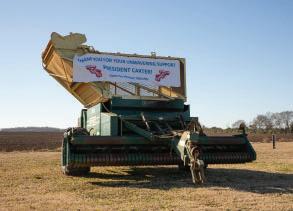
peanuts have been and will be in the future."
Even in his later years, President Carter remained active in Plains, Georgia. The town of Plains was more than a backdrop to President Carter's life — it was the heart of his journey and the place that shaped him into a leader. President Carter passed away at the age of 100 on Dec. 29, 2024, and was laid to rest in his beloved hometown of Plains, Georgia, on Jan. 9, 2025.


The Florida Peanut Producers Association exhibited at the Florida Farm Bureau Federation annual convention held in Destin. The event provided FPPA an opportunity to network with farmers and industry officials who work together to build and grow the state's agricultural industry. Visitors enjoyed Jif-To-Go peanut butter cups and roasted peanuts at the peanut booth. The kids showed their peanut knowledge with the peanut trivia board.
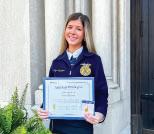
Aubrey Hudson, a junior at the University of Florida majoring in Agricultural Education and Communication, is the daughter of Rollin and Nina Hudson, a Florida Peanut Producers Board member. In October, Aubrey received her American Degree at the National FFA Conference. Aubrey said she is thankful for the FFA organization and everything they have done for her. She can’t wait to give back to her community as an FFA advisor after college.
The American Peanut Council selected Dothan, Alabama, as the location to host more than 30 Mexican Peanut Industry representatives for a Reverse Trade Mission, Oct. 1, 2024. The purpose of this multi-day visit to locations in Alabama, Florida and Georgia was to share the story of peanuts all the way from breeding, planting and harvest to buying points, shelling and manufacturing. APPA was proud to host the delegation and show some southern love to one of America's largest importers of peanuts.

The Alabama Peanut Producers joined Landmark Park in Dothan, Alabama, for their Fall Farm Day Event Oct. 19, 2024. Volunteers at the park demonstrated old-school peanut harvest while APPA handed out promotional peanut items.
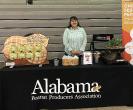
Libbie Johnson, executive director of the Alabama Peanut Producers Association, attended a new event in Huntsville, Alabama, Nov. 2, 2024. The North Alabama Ag Expo featured the latest agricultural equipment, technology, research and other valuable agricultural information. APPA provided interactive, family-friendly ways to learn about peanuts.

Alabama Peanut Producers Association board members promoted Alabama peanuts at the Wine On The River event held Oct. 19, 2024. The activation was set up at USS ALABAMA Battleship Memorial Park in Mobile, Alabama, and featured peanut samples and a photo booth.
Exhibitors go whole hog for Florida
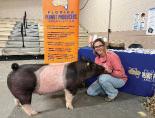
The Panhandle Youth Expo was bustling with kids who are rooted in agriculture. More than 200 youth from across the Panhandle exhibited their livestock projects at the event. The Florida Peanut Producers Association provided youth and spectators samples of locally grown boiled and roasted peanuts at their exhibit. Youth took turns spinning the peanut trivia wheel to learn fun facts about the history of peanuts and the peanut industry. This event brings the public out to learn more about agriculture and gives the youth a chance to showcase their hard work.
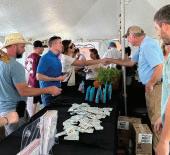
attendees were able to sample fried peanuts and grilled PB&Js at the Peanut Pavilion.
The National Peanut Festival was held Nov. 1-10, 2024, in Dothan, Alabama. The Alabama Peanut Producers promoted peanuts at their tent with freebies, games and networking. As in previous years, the National Peanut Festival donated 1,440 jars of Peanut Proud peanut butter to the Wiregrass Area Food Bank, and APPA matched the donation, for a total of 2,880 jars going straight into the hands of those in need. The donation kicked off the 2024 DreamBig Food Drive, held on Nov. 6, 2024, at the National Peanut Festival fairgrounds.



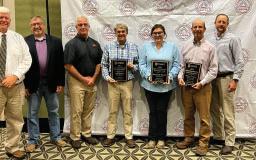
The Georgia Peanut Commission presents Education for Excellence Awards to four University of Georgia Extension agents.
The Georgia Peanut Commission presented the 2024 Georgia Peanut Education for Excellence awards to county Extension agents at their annual meeting in the fall of 2024.
GPC board member Donald Chase presented the awards to the agents. The winners, pictured left to right are Bob Kemerait, UGA Extension plant pathologist; Chase; Eric Prostko, UGA Extension weed specialist; Bill Tyson, 1st place senior agent from Bulloch County; Savannah Tanner, 1st place junior agent from Emanuel County; Wade Parker, 2nd place senior agent; and Mark Abney, UGA Extension peanut entomologist. Not pictured is Cody Powell, 2nd place junior agent from Miller County.

The Mississippi Peanut Growers Association exhibited at the Mississippi Nurses' Association Annual Conference in Biloxi, Mississippi, Oct. 24, 2024. MPGA was able to interact with 250 registered nurses, 200 advanced practice registered nurses and many nursing students from across the state. The exhibit featured early introduction to prevent peanut allergy, peanut allergy management information, nutrition information, recipes, promotional items and peanuts.
Jacob Cernosek, an agribusiness major in the Agricultural Economics Department at Mississippi State University was awarded the Don Self Memorial Scholarship. The scholarship was established in October 2015 in memory of Don Self, a life-long farmer in the Hamilton community of Monroe County, Mississippi. Self was one of the pioneer growers of peanuts in northeast Mississippi and served on board for the National Peanut Board and the Mississippi Peanut Growers Association at the time of his death.
The Mississippi Peanut Growers Association exhibited during the Mississippi School Nutrition Association annual meeting in Tueplo, Nov. 8, 2024. The exhibit focused on using peanut products in the school lunch program. There were special materials provided by National Peanut Board highlighting the nutritional value of peanuts and encouraging allergen awareness in school systems instead of being peanut free. Attendees ranged from directors of school lunch programs across the state plus the lunch room staff who prepare and serve the lunches.
The tradition continued Oct. 31, 2024, when more than 1,000 business executives, community leaders and elected officials attended the Mississippi Economic Council's Hobnob Mississippi event at the Mississippi Coliseum in Jackson. The Mississippi Peanut Growers Association provided 1,200 complimentary bags of roasted peanuts for the annual event.

Peanut Commission exhibits at California School Nutrition Association's annual
The Georgia Peanut Commission exhibited at the California School Nutrition Association’s annual meeting Nov. 14-16, 2024, in Sacramento, California. GPC’s exhibition was a partnership with the National Peanut Board to target larger school districts across the country with peanut nutrition information, allergy management resources and school ban reversal guidance.

Tarrah Westercamp and Jessie Bland visit with attendees during the California School Nutrition Association's annual meeting.

During the three-day event, GPC and NPB sponsored breakout sessions and had NPB consultant, Tarrah Westercamp, MS, RDN, SNS, present an educational session on allergy management in schools. Westercamp’s session garnered more than 100 attendees who were eager to learn more about allergy management, particularly as it relates to peanuts and peanut butter.
The exhibit hall of 350+ vendors allowed productive one-on-one conversations with nutrition personnel, including directors, managers and others. GPC was encouraged to hear many schools were serving peanut butter and were interested in creative ways to incorporate peanuts in future menus. When looking at the top 50 school districts across the United States by volume, California ranks No. 3 behind No. 1 Texas and No. 2 Florida. Georgia ranks No. 4.

State, federal and private peanut breeding programs are actively involved in the development of improved varieties with desirable traits for increasing dollar value, yield, grade, disease resistance, insect resistance, virus resistance, nematode resistance, aflatoxin resistance, drought tolerance, better shelling characteristics, longer shelf-life and enhanced flavor and nutritional qualities.
In the U.S., there are four peanut market types (runner, virginia, spanish and valencia), and within each market type, there are different varieties. The varieties contained in this guidebook reflect those varieties commonly planted in the Southeast and those varieties recommended by agronomists for this area due to resistance to tomato spotted wilt virus (TSWV). Variety selection is an important process in the overall management of the farm. This guidebook serves as a resource for growers when they select a variety for the 2025 crop year.
ACI N104 is a high oleic runner peanut variety with pod and kernel size and shape similar to Georgia06G. It is medium maturity, maturing in about 145 days in South Georgia. It has excellent peg strength and flexibility around harvest timing. It is well adapted to dry land conditions. It has very high levels of resistance to TSWV, white mold and leaf spot. It also has excellent resistance to the peanut root knot nematode, M. arenaria. This variety was developed in South Georgia by ACI Seeds, a privately funded peanut research and development company based in South Georgia with ongoing research across all U.S. peanut growing regions.
ACI 212 is a high oleic, large seeded runner variety with multiple disease resistance. It has good resistance to TSWV, white mold and late leaf spot. It has excellent germination and early vigor for quick row closure and dense canopy. This variety matures in about 140 days in South Georgia. ACI 212 was developed at ACI Seeds, a privately funded peanut research and
development company based in South Georgia with ongoing research across all U.S. peanut growing regions.
ACI 222 is a high oleic, runner peanut with multiple disease resistance. It is medium maturity, maturing in about 145 days in South Georgia. It has excellent resistance to the peanut nematode M. arenaria. It has a high level of resistance to TSWV, white mold and late leaf spot. It was developed in South Georgia and is well suited for the disease pressure in the region. However, it is widely adapted across the Southeast and Southwest peanut growing regions. ACI 222 was developed at ACI Seeds, a privately funded peanut research and development company based in South Georgia with ongoing research across all U.S. peanut growing regions.
ACI 3321 is a large seeded, high-oleic runner peanut. ACI 3321 is a top yielding variety for ACI Seeds and in state variety testing in Alabama, Florida and Georgia. ACI 3321 has a high level of TSWV resistance, best in
class white mold resistance and very good leaf spot resistance. ACI 3321 has demonstrated stability across diverse U.S. peanut production areas. ACI 3321 is well adapted to irrigated and dry-land production. ACI 3321 was developed by Kim M. Moore of ACI Seeds, a privately funded peanut research and development company based in South Georgia with ongoing research and development across all U.S. peanut growing regions. ACI 3321 seed will be commercially available for the planting season.
AU-NPL 17 is a runner type peanut with high-yielding and very good resistance to TSWV, highly tolerant to leaf spot, strong resistance to white mold and superior shelling characters. AU-NPL 17 has a prostrate growth habit with main stem and with large vines. It has high oleic fatty acid content and excellent flavor. AU-NPL 17 is well adapted to irrigated and non-irrigated lands across diverse U.S. peanut production areas. AU-NPL 17 has a lot of desirable characteristic to mitigate challenging growing
Continued on page 12
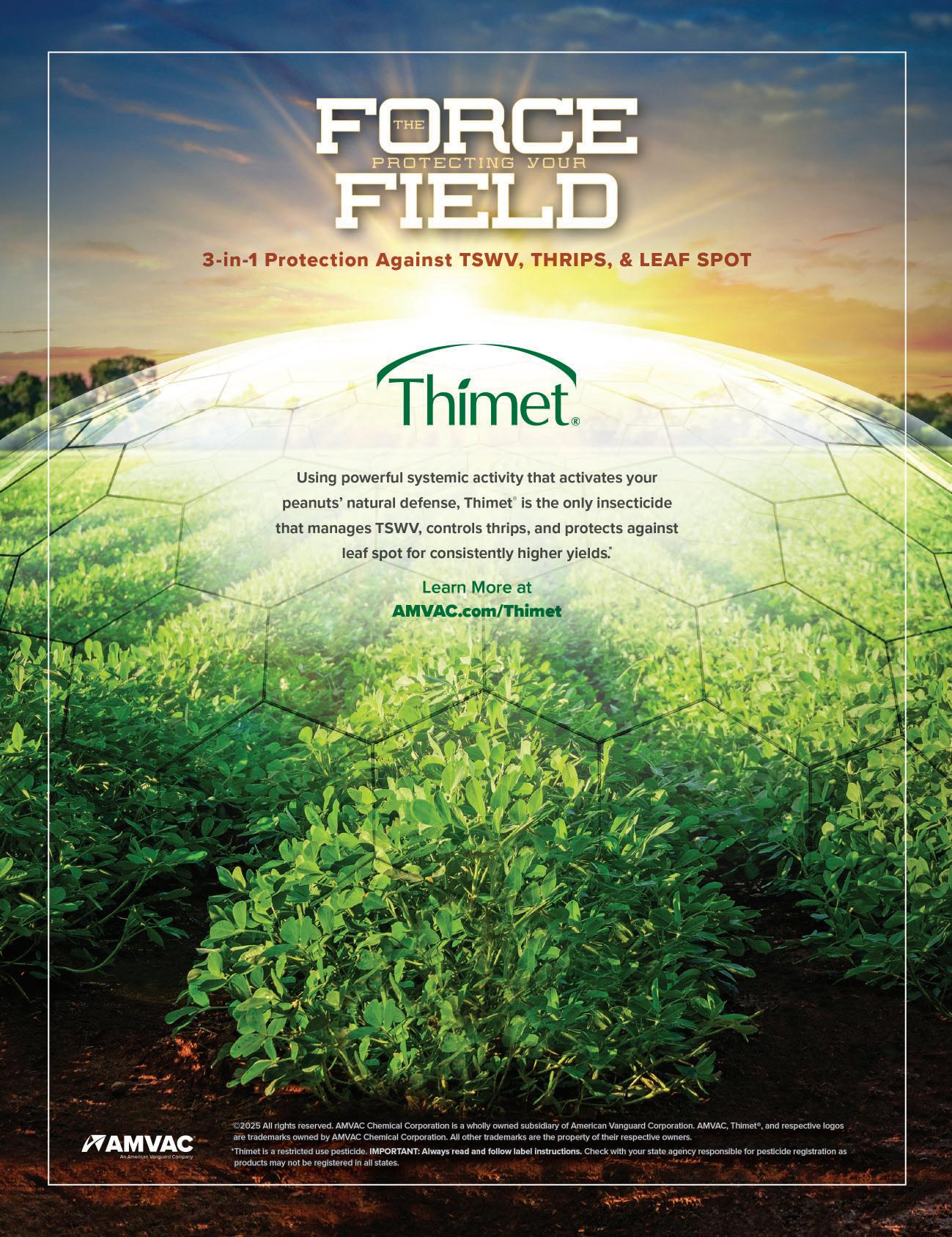
conditions from year to year including strong disease package, good stem strength, larger vine and late season drought tolerance et al. The seeds have pink testa and medium large runner seed size, which is a little smaller than Georgia-06G. AU-NPL 17 was released by Auburn University and USDA-ARS National Peanut Research Laboratory in 2017.
FloRun™ ‘331’ is a high-yielding, medium maturity, disease tolerant runner-type variety released from the University of Florida, North Florida Research and Education Center, Marianna, Florida, in 2016. It has medium runner seed size with very good grades. FloRun™ ‘331’ has had excellent pod yield in both irrigated and non-irrigated trials over several seasons of testing across several locations in Florida. Of the runnertype varieties tested for resistance to leaf spots and white mold, FloRun™
‘331’ has had among the best pod yield and lowest disease scores and it is moderately resistant to TSWV. FloRun™ ‘331’ has high oleic oil chemistry beneficial for extended shelf-life and marketability of peanuts and peanut products.
FloRun™ ‘52N’ is a new medium maturity runner type with small vines, high-yield, high grade, and normal oleic oil chemistry that was released from the University of Florida, North Florida Research and Education Center in 2023. The seed size of FloRun™ ‘52N’ is in the medium range with about 710 seeds per pound from the SMK (sound mature kernels). FloRun™ ‘52N’ has had TSMK grade, in the mid to upper 70’s, in on-farm demonstrations and in Foundation and Registered seed production resulting high value returns in production settings. The yield of FloRun™ ‘52N’ was among the highest in Florida irrigated and nonirrigated tests over a three-year period
in several locations. FloRun™ ‘52N’ has smaller than average vines making it a good fit for twin-row production and situations where vine production of other varieties is excessive. It has performed well in tests for tolerance to leaf spot, white mold and TSWV and has a sound overall disease package that will respond well to standard disease management recommendations for peanut as outlined in the Peanut Rx. In summary, FloRun™ ‘52N’ combines normal oleic oil chemistry with smaller vines, high yield, and high TSMK grade to meet the needs of peanut growers, shellers and manufacturers.
FloRun™ ‘T61’ is a new high yielding, TSWV resistant, medium seeded, runner type variety from the University of Florida. It was released in 2020 from the North Florida Research and Education Center in Marianna, Florida. FloRun™ ‘T61’ has high yield potential demonstrated over multiple locations in Florida as
well as in on-farm tests. It has high grades and outstanding resistance to spotted wilt which is the reason for the "T" in T61. During several years of testing, FloRun™ ‘T61’ has proven to resist TSWV and produce high yields when disease pressure from TSWV reduced yield of other varieties. It has a medium seed size with about 650 seeds per pound and just over 40 percent medium kernels on an in-shell basis. The vine growth of FloRun™ ‘T61’ is moderate, allowing good performance in twin rows without excessive vine production. The maturity of FloRun™ ‘T61’ is in the medium range of 140-145 days after planting under irrigation in Florida. The pod yield of FloRun™ ‘T61’ has been excellent and better than Georgia-06G in tests across several Florida locations. It also performed very well in on-farm demonstration plots in Florida topping the yield in several locations. FloRun™ ‘T61’
has high oleic oil and should be an excellent choice for farmers, shellers and manufacturers who need peanuts with the high oleic trait.
Georgia-06G is a high-yielding, TSWV-resistant, large-seeded, runnertype peanut variety that was released in 2006 by the University of Georgia, Coastal Plain Experiment Station, Tifton, Georgia. Georgia-06G has a high level of resistance to TSWV. In multilocation tests conducted in Georgia during the past several years, Georgia-06G was found to have among the lowest disease incidence, highest pod yield, highest TSMK grade and highest dollar value return per acre compared to other runnertypes tested each year. Georgia-06G combines high TSWV resistance with medium maturity and excellent yield and high TSMK grade which results in greater dollar value return per acre.
Georgia-09B is a high-yielding, high-oleic, TSWV-resistant, mediumseeded, runner-type peanut variety that was released in 2009 by the University of Georgia Coastal Plain Experiment Station in Tifton, Georgia. Georgia-09B has a high level of resistance to spotted wilt disease caused by TSWV. Georgia-09B also has the high-oleic and low-linoleic fatty acid ratio for improved oil quality and longer shelf-life of peanut and peanut products. Georgia-09B originated from the first backcross made with Georgia Green as the recurrent parent. It has an intermediate runner growth habit and medium maturity, similar to Georgia Green. Georgia-09B has a medium runner seed size. Georgia09B combines the excellent roasted flavor of Georgia Green with the high-oleic trait for longer shelf-life and
Guidebook Continued from page 13
Georgia-12Y is a high-yielding, TSWV-resistant, white-mold resistant, medium-seeded, runner-type peanut variety that was released in 2012 by the Georgia Agricultural Experiment Stations. It was developed at the University of Georgia, Coastal Plain Experiment Station in Tifton, Georgia. Georgia-12Y is similar to another runner-type variety Georgia-10T in having low TSWV disease incidence and total disease incidence. However, during several years averaged over multilocation tests in Georgia, Georgia-12Y had significantly higher pod yield and higher dollar value return per acre compared to Georgia10T. Georgia-12Y also has a smaller
seed size (greater number of seed per pound) than Georgia-10T. Georgia-12Y should be an excellent variety for an earlier planting (April) option in the Southeast because of its high TSWV and white mold-resistance and later maturity.
Georgia-14N is a high-yielding, high-oleic, TSWV-resistant, and RKNresistant, small-seeded, runner-type peanut variety that was released in 2014 by the Georgia Agricultural Experiment Stations. It was developed at the University of Georgia, Coastal Plain Experiment Station in Tifton. Georgia-14N is similar to other higholeic, runner-type varieties in having high-oleic and low-linoleic fatty acid profiles. However, during threeyears averaged over multilocation tests in Georgia, Georgia-14N had significantly less TSWV and total disease incidence and higher yield,
grade and dollar value return per acre compared to Tifguard. Georgia-14N combines high-yield, TSWV resistance and root knot nematode resistance with smaller seed size, and the higholeic trait for longer shelf-life and improved oil quality of peanut and peanut products.
Georgia-16HO is a high-yielding, high-oleic, TSWV-resistant, largeseeded, runner-type peanut variety that was released in 2016 by the Georgia Agricultural Experiment Stations. It was developed at the University of Georgia, Coastal Plain Experiment Station, Tifton, Georgia. Georgia-16HO is similar to other higholeic, runner-type varieties in having the high-oleic and low-linoleic fatty acid profile. However during several years averaged over multilocation tests in Georgia, Georgia-16HO had less TSWV and total disease incidence
and higher yield, grade and dollar value return per acre compared to TUFRunner™ ‘511’. Georgia-16HO was also found to have a large runner seed size similar to TUFRunner™ ‘511’, but not as large of seed size as TUFRunner™ ‘297’. Georgia-16HO combines high-yield, TSWV resistance with large runner seed size, and the high-oleic trait for longer shelf-life and improved oil quality of peanut and peanut products.
Georgia-18RU is a high-yielding, normal-oleic, TSWV-resistant and leaf scorch-resistant, medium-large seeded, runner-type peanut variety that was released by the Georgia Agricultural Experiment Station in 2018. It was developed at the University of Georgia, Coastal Plain Experiment Station, Tifton, Georgia. During five-years averaged over multiple location tests in Georgia,
Georgia-18RU had the highest percent TSMK grade and the lowest number of seed per pound compared to the Georgia-06G runner-type variety. Georgia-18RU was also found to have a similar low percent TSWV and total disease incidence, high yield and dollar value return per acre as Georgia-06G. Georgia-18RU combines high yield, high grade, high dollar value and TSWV and leaf scorch resistance with the desirable normal-oleic trait requested by peanut butter manufacturers. It also has similar roasted flavor, blanchability and maturity as Georgia-06G.
Georgia-20VHO is a highyielding, high-grading, TSWV-resistant, very high-oleic to linoleic ratio, runner-type peanut variety that was released by the Georgia Agricultural Experiment Station in 2020. It was developed at the University of
Georgia, Coastal Plain Experiment Station, Tifton, Georgia. During five-years and three-years averaged over multilocation tests in Georgia, Georgia-20VHO had significantly higher percentage of total sound mature kernel grade compared to Georgia-09B and six other high-oleic runner varieties, respectively. It was also among the lowest in TSWV and total disease incidence and among the highest in pod yield and dollar values compared to the other high-oleic runner varieties in Georgia. Georgia20VHO, as the name implies, has a very high O/L ratio, similar to another VHO virginia-type variety Georgia-11J. Georgia-20VHO combines high yield, grade and dollar values with TSWV resistance and very high O/L ratio for longer shelf-life of peanut and peanut products.
Continued on page 16
Georgia-06G
Georgia-09B
Georgia-12Y
Continued from page 15
Georgia-21GR is a high-yielding, high-grading, TSWV-resistant, normal oleic, runner-type peanut variety that was released by the Georgia Agricultural Experiment Station in 2021. It was developed at the University of Georgia, Coastal Plain Experiment Station, Tifton, Georgia. During six-years averaged over multilocation tests in Georgia, Georgia-21GR had significantly higher percentage of total sound mature kernel (TSMK) grade compared to Georgia-06G, a widely popular runner variety. It also had similar low TSWV and total disease incidence and comparable high pod yield and dollar values as Georgia-06G. Georgia-21GR, as the name implies, has a very high TSMK grade percentage. Georgia21GR combines high yield, grade and dollar values with TSWV resistance and normal oleic in a medium-large seeded, runner-type peanut variety.
Georgia-22MPR is a new highyielding, high-oleic, TSWV-resistant, Root-knot nematode resistant and leafhopper-resistant, runner-type peanut variety that was released by the Georgia Agricultural Experiment Station in 2022. It was developed at the University of Georgia Coastal Plain Experiment Station in Tifton, Georgia. During four-years averaged over multilocation tests in Georgia, Georgia-22MPR had significantly higher yield and dollar value compared to Georgia-14N and TifNV-High O/L runner varieties. Georgia-22MPR as the name implies has multiple pest resistance. Georgia22MPR combines high yield and dollar values with virus, nematode and insect resistance in a high-oleic, mediumlarge seeded, runner-type peanut variety.
to late leaf spot and TSWV. It is a medium maturity class peanut, with about 140 days needed for optimal maturity. TifCB-7 has an extremely high level of resistance to late leaf spot which should greatly reduce the need for fungicide sprays. When evaluated under full fungicide spray regimes, TifCB-7 yielded at least equivalent to other common peanut cultivars. TifCB-7 had higher yields than common cultivars when tested with no fungicide control for leaf spot. Growing TifCB-7 with reduced fungicide sprays can be used to maximize on farm profitability.
TifNV-HG is a runner-type peanut variety release by the USDAARS and the University of Georgia. Marker assisted selection was used to select for nematode resistance and the high-oleic to linoleic (O/L) characteristic. TifNV-HG has a high level of resistance to both the peanut root-knot nematode and TSWV and has a high ratio of oleic acid to linoleic acid. When tested in fields without nematode pressure TifNV-HG exhibited yields that were at least similar to other currently grown peanut varieties. When tested in fields with nematode pressure, TifNV-HG exhibited yield that was at least equivalent to the nematode resistant varieties, TifNV-High O/L and Georgia 14N, and significantly higher than susceptible varieties. TifNV-HG exhibited higher grade in comparison the TifNV-High O/L.
Akins and Ye Chu in using molecular markers for nematode resistance and the high O/L trait. Using the molecular markers, they were able to greatly speed up the process of developing the new variety.
TUFRunner™ ‘297’ is a high yielding, extra-large seeded, medium maturity runner-type peanut with high oleic oil chemistry developed by the University of Florida, North Florida Research and Education Center, Marianna, Florida. It was released in 2014. TUFRunner™ ‘297’ has demonstrated very good resistance to white mold, good resistance to TSWV and is susceptible to leaf spots. Yield and grade of TUFRunner™ ‘297’ have been excellent. It has a prominent center stem with a semi prostrate growth habit.
TifCB-7 is a new high-yielding, high-grading, variety that was released by the USDA-ARS and the Georgia Agricultural Experiment Station in 2023. TifCB-7 is a high oleic acid, runner market-type cultivar that also has high resistance
TifNV-High O/L is a high oleic peanut variety developed and released by USDA-Agricultural Research Service peanut breeder Corley Holbrook. It's a high oleic version of the nematode resistant Tifguard that Holbrook released several years ago. The variety offers high yields, nematode resistance, a high concentration of oleic acid, resistance to spotted wilt virus, moderate resistance to leaf spot and medium maturity. TifNV-High O/L resulted from a cross between Tifguard and the Florida-07 varieties. Holbrook worked with University of Georgia researchers Peggy Ozias-
TifJumbo is a virginia-type peanut variety release by the USDA-ARS and the University of Georgia. Marker assisted selection was used to select for nematode resistance and the higholeic to linoleic (O/L) characteristic. TifJumbo has a high level of resistance to both the peanut root-knot nematode and TSWV and has a high ratio of oleic acid to linoleic acid. TifJumbo also has a moderate level of resistance to leaf spot. When tested in fields without nematode pressure TifJumbo exhibited yields that were at least similar to other currently grown peanut varieties. When tested in fields with nematode pressure, TifJumbo exhibited significantly higher yields in comparison to other viriginia-type peanut varieties.
There are two new peanut varieties released for growers. However, there will be limited seed available for each variety. The varieties were developed through the breeding programs at the University of Georgia and the University of Florida.
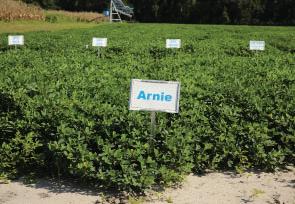
'Arnie' is a new runner type peanut variety released by the University of Florida-IFAS on Jan. 26, 2024. 'Arnie' peanut cultivar was developed at the University of Florida, North Florida Research and Education Center near Marianna, Florida, from a cross made in 2014.
The 'Arnie' peanut cultivar is named after Arnold 'Arnie' Forrester, who was a farmer in Jackson County until his tragic death on Jan. 1, 2022. Forrester was an outstanding farmer and always searching for new technology to improve his farming operation. He was also a strong collaborator with UF-IFAS.
"It is rare to find an engineer-farmer, but in his professional life, Arnie Forrester was the perfect combination of the two. As an engineer, he was meticulous, deliberate and analytical with a strong desire to learn more and more, to support his decision-making process. As a farmer, he was hard-working, determined, and studious, always executing his plan and observing the crop to make sure it had everything needed," says Barry Tillman, University of Florida peanut breeder.
The characteristics of 'Arnie' include high yield potential, high TSMK grade, and excellent tolerance to tomato spotted wilt virus. 'Arnie' has normal oleic oil chemistry, making it the second recent release from the University of Florida-IFAS with this trait. Some of the largest producers of peanut butter in the USA prefer the normal oleic trait and peanut butter represents over half of peanuts produced in the USA.
In twenty-three Florida tests over five years and three locations, the pod yield of 'Arnie' was greater than that of Georgia-06G, the dominant peanut cultivar grown today. The TSMK grade of 'Arnie' was slightly greater than Georgia-06G as well. The tolerance of 'Arnie' to tomato spotted wilt is probably one of its most impressive features. In tests conducted in Florida and Georgia, the spotted wilt disease ratings of 'Arnie' were significantly lower than Georgia-06G and similar to Georgia-12Y, which has the best tolerance to spotted wilt among cultivars grown today. 'Arnie' is medium in maturity requiring about 140 until maturity in Florida under irrigation. It has a relatively small runner seed size of about 700 SMK per pound and produces about 38 percent medium seeds on an in-shell basis. Another unique feature of Arnie is that about 15 percent of its pods contain three seeds.
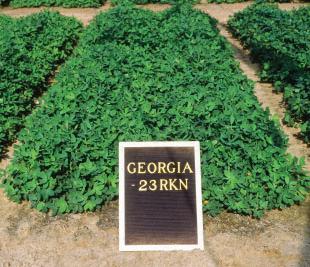
Georgia-23RKN is a new high-yielding, normal-oleic, TSWV-resistant and Root-knot nematode resistant, runner-type peanut variety that was released in 2023 by the Georgia Agricultural Experiment Stations. It was developed at the University of Georgia Coastal Plain Experiment Station in Tifton, Georgia. Georgia-23RKN has significantly less TSWV and total disease incidence compared to the Tifguard and TifNV High O/L varieties in Georgia. It also has very high-level of RKN resistance similar to Georiga-14N. However, Georgia23RKN has a normal-oleic fatty acid O/L ratio similar to Tifguard. Georgia-23RKN combines high yield and dollar values with high TSWV-resistance and RKNresistance in a normal-oleic, medium-large seeded, runner-type peanut variety.
By Brandon Ward
William "Bill" D. Branch, who holds the Georgia Seed Development Professorship in Peanut Breeding and Genetics in the University of Georgia College of Agricultural and Environmental Sciences, has been elected as Fellow for the National Academy of Inventors.
Branch is the 17th UGA faculty member to receive this honor, which recognizes inventors whose innovations have had a significant impact on society, economic development and quality of life.
"We're proud to see another innovative UGA faculty member elected to the National Academy of Inventors," says interim Vice President for Research Chris King. "Dr. Branch has made remarkable contributions to the agricultural industry, and his work in plant breeding underscores the significant impact UGA research continues to have around the globe."
Branch's groundbreaking work in peanut breeding has led to the development of more than 30 novel, licensed peanut varieties. His research has earned him accolades such as the National Peanut Buying Points Association Impact Award, the Innovator Award from the Georgia Peanut Commission, UGA's Inventor of the Year Award in 1997, induction into the Georgia Agricultural Hall of Fame, and even the nickname "godfather of peanuts."
Georgia's peanut industry contributes about $1.8 billion annually to Georgia's economy. Branch's cultivars account for 85 percent of the peanut acreage grown in Georgia and the Southeast, bolstering Georgia's position as the leading peanutproducing state. His two diseaseresistant cultivars, Georgia Green and Georgia-06G, have been credited with
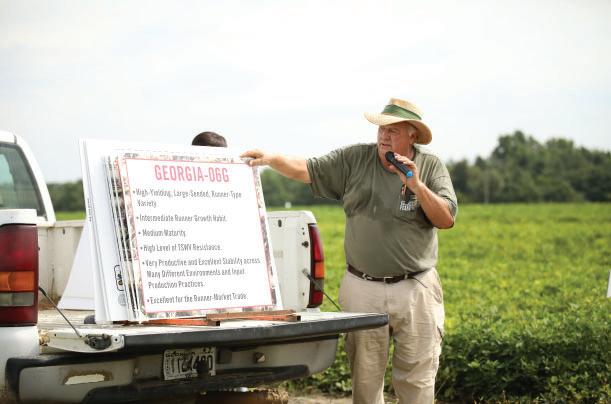
saving the Southeastern U.S. peanut industry thanks to their resistance to tomato spotted wilt virus.
With over 30 U.S. Plant Variety Protection Certificates and multiple patents to his name, Branch's innovations have generated more than $72 million in royalties for UGA, the most of any agriculturerelated technology. All 30 of those varieties have been licensed and commercialized in the U.S., generating more than 500 non-exclusive license agreements.
Beyond his research, Branch has made significant contributions to academia, mentoring numerous students and publishing over 350 research papers, with more than 150 in refereed journals. He is a member of several esteemed professional organizations, including the American Peanut Research and Education Society, the American Society of Agronomy, Council of Agricultural Science and Technology, and the
American Peanut Council.
Branch's work exemplifies UGA's land-grant mission, fostering collaboration with industry to address and solve real-world problems. His peanut breeding program is recognized as a leading example internationally.
Branch credited his family and faith for helping him throughout his career.
"I am truly honored to have been elected as an NAI Fellow," he said. "It normally takes 10 to 20 years to develop a new peanut variety. Consequently, you have to be very patient to succeed. Any success I have obtained is all credit to my wife, Milla, and family for their continued support for all these years. Together with our Lord, we have been able to reach new heights."
Branch will be officially inducted as an NAI Fellow on June 23 at the 14th Annual Conference in Atlanta.
Tackling complex global challenges through lab work, data analysis, and critical thinking might seem daunting, but high school students like Harrison Carter are embracing the opportunity. Harrison, a ninth-grade student at Houston Academy, is participating in the HudsonAlpha WIREGRASS Peanut Project.
"I grew up in the business of peanuts," Harrison says. It makes sense that the next in line to LMC Manufacturing learns the peanut business at an early age, but it makes even more sense for him to improve it - for both the company and his community.
LMC Manufacturing is the heart of the peanut industry. A world leader in industrial separation equipment, the company processes nearly 100 percent of the United States' peanut crop. According to the American Peanut Council, peanuts are one of the country's most valuable exports, with more than half a billion tons shipped out each year, yielding nearly $700 million dollars. Founded in Donalsonville, Georgia, by Harrison's great-great-grandfather H.M. Carter, LMC has created a lasting impact in the U.S. and southeastern community for more than eight decades.
LMC's success stems from both its traditional approach to peanut and nut processing and its commitment to constant innovation. As the science and technology behind crop production evolve, LMC plans to stay on the cutting edge.
Marcus Carter, president and CEO and Harrison's dad says, "At LMC, we believe that innovation is about more than just creating cutting-edge machinery, it's about understanding our clients' unique challenges and providing tailored solutions that drive efficiency and performance. We're dedicated to staying at the forefront of the industry by linking advanced technologies with everything we do."
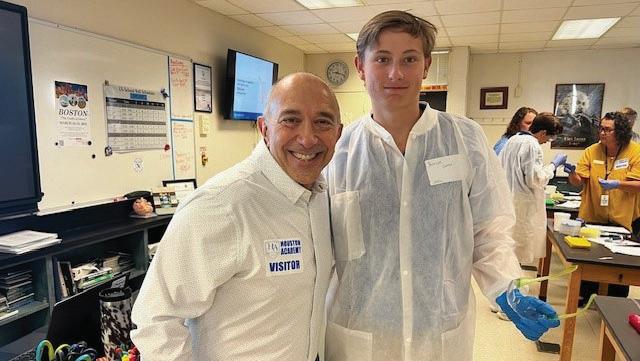
That journey to innovation leads to southeast Alabama and Harrison. For the last year, he has been involved with the HudsonAlpha WIREGRASS Peanut Project, a project incorporated into the City of Dothan and Wiregrassarea schools, including Houston Academy, through HudsonAlpha Wiregrass. The project gives students hands-on experience, using genomics to develop more drought- and disease-resistant peanut varieties.
Harrison and his classmates apply this science in the classroom, with real-world results that can impact the future of agriculture. Harrison is gaining research experience - lab work, data analysis, and critical thinking skills - that he believes will help shape the future of farming.
"I think this project is going to help farmers and LMC to develop new varieties of peanuts, build new machines, make production more efficient and stable both in the U.S. and worldwide," he says.
The project is overseen by HudsonAlpha's Educational Outreach team and led by HudsonAlpha Faculty Investigator Josh Clevenger, PhD, whose research focuses on crop improvement for sustainable agriculture.
"This project showcases the application of genetics and biotechnology in agriculture and is the only program in the country that is working with students producing real-world results," Clevenger says. "Peanuts are a vital crop for millions across the globe. Through this project, we are helping student scientists take the first steps in developing better varieties and introducing this work to future farmers and scientists, who will help the industry thrive."
The WIREGRASS Peanut Project aims to bring modern technology, like genomic sequencing, to a traditional industry. It emphasizes teaching students that there can be synergy between cutting-edge genomic research and physical peanut processing at manufacturing plants like LMC. Harrison’s experience with the WIREGRASS Peanut Project may be the first step in blending tradition and innovation in agriculture research, paving the way for the future of both manufacturing and farming. The integration of genomics research and manufacturing expertise could have a major impact on the Carter family business - and the peanut industry as a whole.
By Joy Crosby
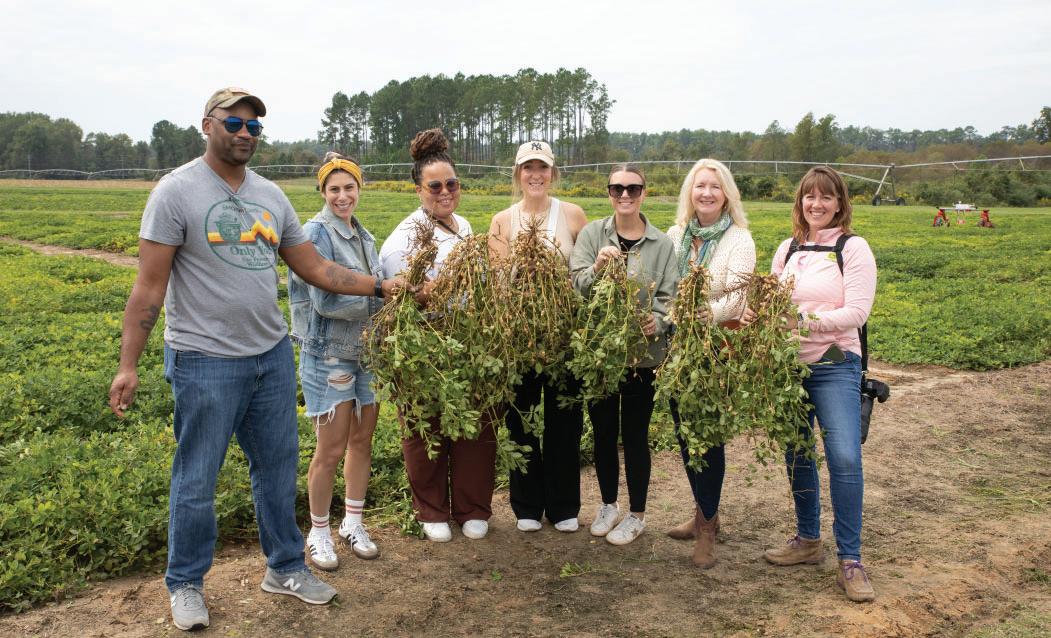
In today’s digital world, influencers play a key role in shaping consumer perceptions and driving conversations. That’s why bringing them on an exclusive tour of the peanut industry is an exciting opportunity to showcase the journey of this beloved crop—from the fields where peanuts are grown to the processing facilities that turn them into delicious and nutritious products.
Through firsthand experiences, behind-the-scenes access, and engaging storytelling, influencers can share the dedication, sustainability, and innovation that go into peanut production. This immersive experience not only educates but also helps bridge the gap between consumers and the hardworking farmers, processors, and researchers behind every peanut-based product.
The Georgia Peanut Commission
and Southern Peanut Growers teamed up this past fall to host food influencers and chefs on a Georgia Peanut Harvest Tour. The event included seven chefs and food influencers from Connecticut, Virginia, Minnesota, Georgia and Canada.
Throughout the tour, attendees were able to learn more about peanut breeding, use of technology on the farm, view peanut harvest and learn more about the grading, inspection and shelling operation of peanuts, as well as the food manufacturing process. The attendees toured the University of Georgia Griffin and Tifton campus, Jamspread Farm in Americus, Georgia, Senkbeil Farms in Sylvester, Georgia, Georgia Peanut Commission, Tifton Peanut Company, Tifton Quality Peanuts and PB2 Foods.
During the event, the social media influencers posted stories to
Instagram and Facebook and video reels to TikTok. The social media impressions through Instagram reached 2.2 million impressions.
The Instagram Reels provided influencers a fun way to share information about seed storage, peanut breeding, shelling and harvesting peanuts. The reels provided an easy way to share technical information in a fun environment that consumers could relate to.
This was also the first time many of the attendees stepped foot on a peanut farm. At Billy Senkbeil's farm in Sylvester, Georgia, influencers were able to ride in the cab of the tractor while digging peanuts.
"Attending the 2024 Peanut Harvest Tour was an incredible experience! As an influencer and food blogger, getting a firsthand look at
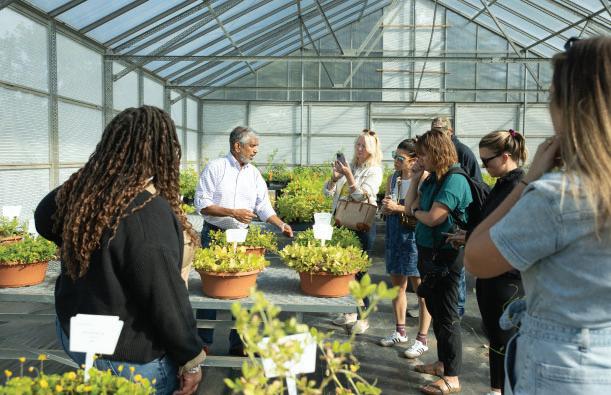
the peanut farming process gave me a deeper appreciation for the industry and the people behind it," says Bailey Campbell, influencer with Basics with Bails from Canada. "The knowledge I gained will help me create more informed content, share the story of where our food comes from, and inspire my audience with new recipes and insights."
The influencers included on the tour were Melissa Rifkin, Confessions of a Dietitian; Bailey Campbell, Basics with Bails; Katie Brown, Real Food with


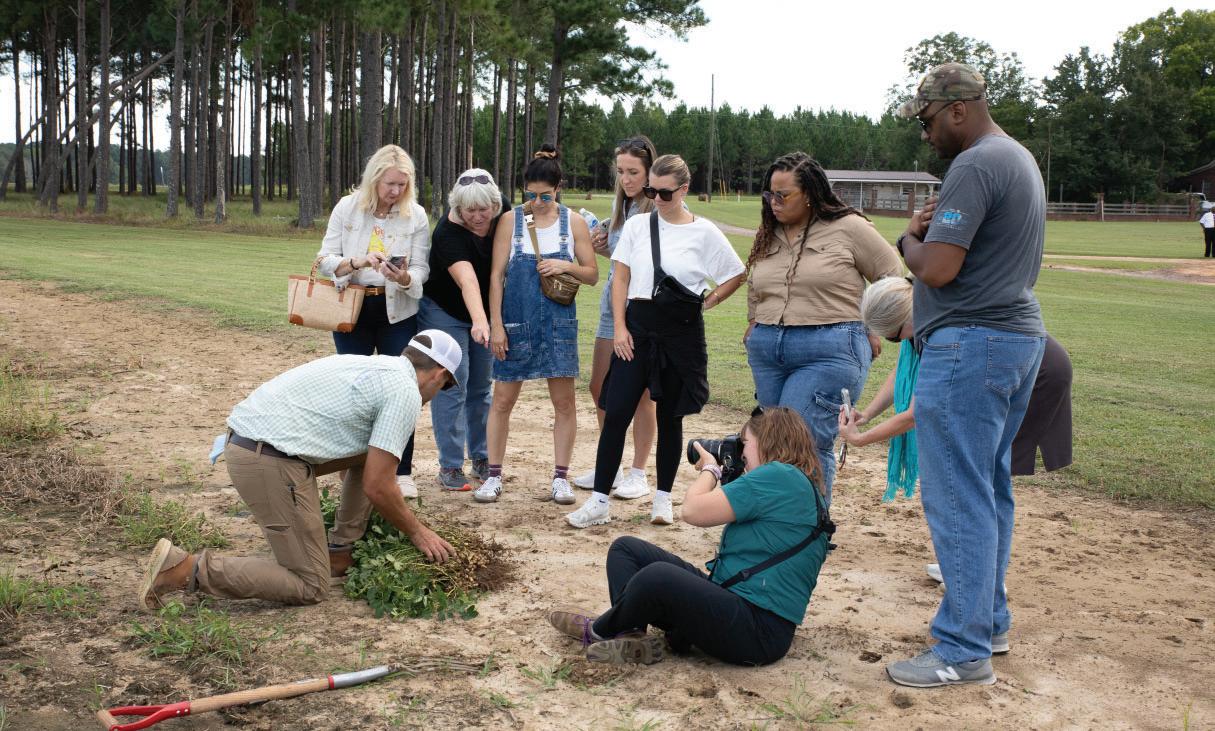
Gratitude; Carolyn O'Neil and Katie Knapp, The Ag Photographer. The tour also hosted Calandra Peyton and Chef Oliver Prince, chefs and culinary instructors in DeKalb County, Georgia.
Following the tour, the food bloggers took to their kitchens and created additional peanut recipes
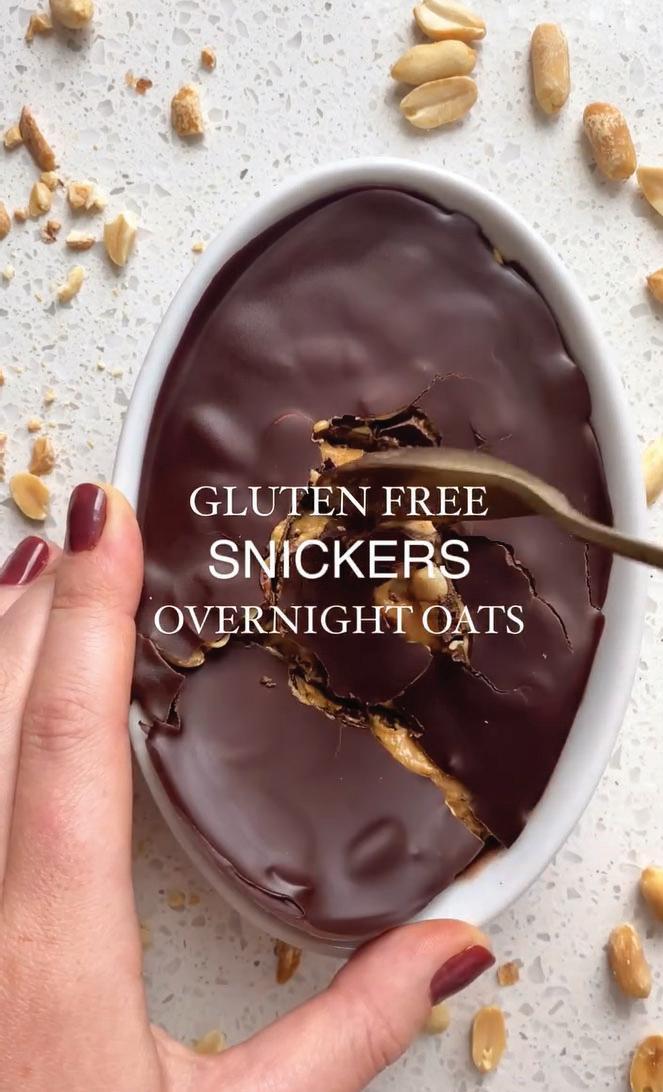
to share with their followers. The new recipe developments provided additional exposure for the peanut industry following the tour.
The National Peanut Board, The Peanut Institute and American Peanut Council also provided additional funds to support the tour.
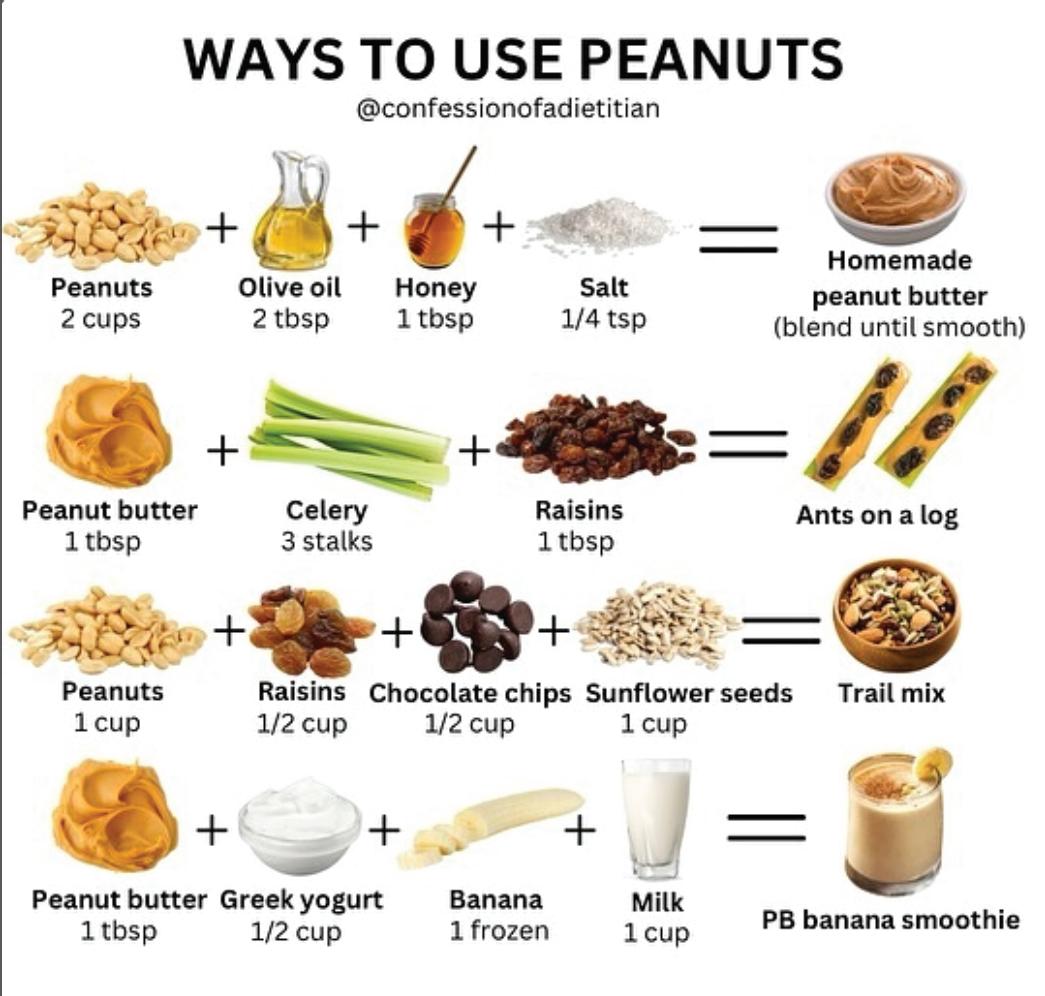




By Robert L. Redding Jr.
Representatives from the U.S. Peanut Federation (USPF) traveled to Washington, D.C. recently to advocate for assistance needed before the end of 2024. During the trip, USPF representatives met with Members of the U.S. House of Representatives and U.S. Senate, as well as senior agricultural staff, to engage in discussions on economic assistance, natural disaster assistance, and the Farm Bill.
In November 2023, the U.S. House of Representatives and U.S. Senate passed a 1-year extension of Farm Bill programs at the same levels authorized in the 2018 Farm Bill. This extension expired on Sept. 30, 2024, and some federal programs became unavailable. Crop insurance, primary nutrition, disaster, and other programs have been enacted as permanent law and access to federal assistance will remain available.
After much deliberation, on Dec. 20, 2024, the U.S. House of Representatives passed H.R. 10545 by a vote of 366-34, which included a continuing resolution for FY25 appropriations funding, a one-year extension of the 2018 Farm Bill, $10 billion in agricultural economic assistance, and $21 billion in agricultural disaster assistance. The U.S. Senate passed H.R. 10545 overnight by a vote of 85-11, and President Biden signed the bill into law later Dec. 21, 2024.
USPF representatives played a vital role in advocating for legislative initiatives during their meetings on Capitol Hill, addressing the need for economic assistance before 2025 due to the current extreme economic conditions and low probability, in many cases, of accessing loan services for the next crop year. Additionally, many southern growers were impacted by back-to-back hurricanes this year, only worsening their
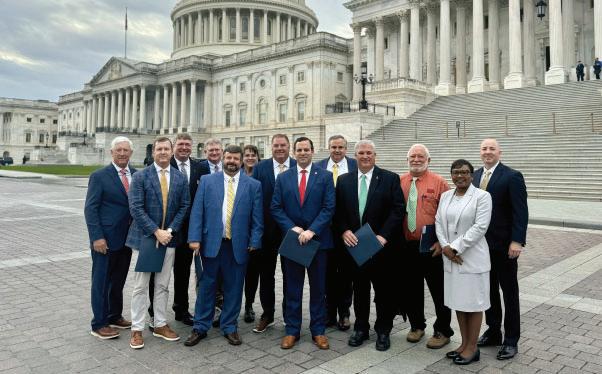
situation and increasing the need for financial support.
Chris Chammoun, executive director of the American Peanut Shellers Association, was one of the USPF representatives in attendance.
"We had great visits on Capitol Hill and were glad members of Congress took the time to hear the concerns of the peanut industry," Chammoun says. "We look forward to continuing to work with members to address the current needs of the industry."
Joe Boddiford, chair of the Georgia Peanut Commission attended the trip to D.C. as well.
"Times are hard back on the farm, and we haven't seen an economic crisis like this since the early 1980s," Boddiford says. "If financial assistance is not prompt, many farmers will be forced out of business and not be able to farm again."
Carl Sanders, president of the Alabama Peanut Producers Association joined in representing

peanut growers from Alabama.
"The economics of row crop agriculture has been tough for all growers, with many growers questioning how to continue farming in 2025," Sanders says. "With the season drawing to an end, this visit to D.C. was imperative to let our elected officials know how dire the situation is. The concern and interest in potential solutions we received from our legislators and staff from both sides of the aisle was palpable; everyone knows that food and fiber production is imperative to the safety and independence of the U.S."
The peanut industry has lost several farmers and industry leaders over the past few months. We remember the advancements each one made in their lifetime to the peanut industry.
St. Elmo Harrison

St. Elmo Harrison, 101, of Whigham, passed away Thursday, Nov. 7, 2024, just fifteen days shy of his 102nd birthday. Harrison served his country during World War II in the United States Navy and also farmed in Whigham.
As a member of The Greatest Generation, Harrison witnessed many changes over the years. His life story includes history from multiple generations, and he relished in sharing his knowledge of Grady County and Georgia. His years on the farm included evolving methods of production. Embracing the “newfangled ways” earned him many production awards. Additionally, St. Elmo & Kathryn were recognized as Grady County Farm Family of the Year, and he was recognized as Georgia Peanut Farmer of the Year.
Memorial donations may be made to Whigham School FFA, 211 W. Broad Avenue, Whigham, Georgia 39897 or Tired Creek Primitive Baptist Church Cemetery Fund, C/O Amy Fowler, 2528 Tired Creek Road, Whigham, GA 39897.
Jim Moore

James L. Moore, of Albany, Georgia, passed away Jan. 5, 2025. He was born in Suffolk, Virginia, before moving to Southwest Georgia and enjoyed a life filled with family, passion for his work, and dedication to his community.
Moore devoted 40 years to the peanut industry, where he earned
respect and admiration for his leadership and tireless advocacy. He was a key figure with the American Peanut Council, serving on the Board and holding several officer positions. Notably, Moore was chairman of the National Peanut Council from 1985-1987. During his tenure, The Peanut Research Foundation was incorporated to support the industry's research and innovation, a legacy that continues to this day. He was also a dedicated member of The American Peanut Shellers Association and the Peanut and Tree Nut Processors Association, where his contributions to industry initiatives, including The Peanut Institute, helped shape the future of the peanut industry.
In lieu of flowers, the family asks that donations be made to The Peanut Research Foundation 1500 King St, Suite 301 Alexandria, Virginia 22314 in honor of Moore’s lifelong work and passion for the peanut industry.
Wilbur Gamble

Wilbur Thomas Gamble Jr. passed away Jan. 10, 2025, in Terrell County. He was a lifetime farmer and graduate of Georgia Southwestern College. He served 12 years in the Army National Guard achieving a rank of Sergeant. He served 48 years as chairman of the Terrell County Commission; the longest serving county commission chairman in the history of Georgia and he never missed a regular monthly meeting; 576 meetings during that time.
He was chairman of the Georgia Peanut Commission from 1985 until 1996 and served on the board for 23 years. When he began with the Peanut Commission, he was afraid to fly, but ended up traveling to over 80 countries and became known as the "Peanut Man." At one point, he was the largest individual owner of peanut quota pounds in the entire country. 60 minutes, with Leslie Stahl, devoted an
entire segment to him.
He was a devoted member of Parrott Baptist Church for over 70 years. He was on the Board of Directors for the Bank of Dawson and long- time past president of the Dawson Country Club. He held season tickets to the Georgia Bulldogs football team for over 50 years and, of course, handed out packs of Georgia peanuts to everyone he saw each game. He also passed out peanuts on the beach, at high school games and anywhere else people gathered.
More than anything else he remained to the end committed entirely to Terrell County Georgia, a place he called home all his life and the only place he ever wanted to be.
Bob Moss

Robert "Bob" Burgess Moss, Sr., of Plains, Georgia, passed away Monday, Jan. 20, 2025. He lived his life in service to God, family and country. He was a crewchief in the Air Force for the F-86 and P-51 in the Korean War, earning the Bronze Star.
He accepted the job of Superintendent of the University of Georgia Coastal Plains Experiment Station in Plains in 1961. Moss served the University of Georgia for 34 years and upon retirement enjoyed consulting for Birdsong Peanuts. This led to consulting internationally with French company, Menguy’s, which afforded him many wonderful trips across the pond. He served on the board of Southwest Georgia Farm Credit until his final retirement at the age of 83.
He was an active member of Plains Methodist Church and the Lions Club for many years. He served the church in various capacities over his lifetime, especially with the annual chickenque fundraiser where he created the legendary BBQ sauce still used today, which has become known simply as "Moss Sauce."
The National Peanut Board held its last meeting of 2024, Dec. 10, in Atlanta, Georgia. The Board approved a new slate of officers for a one-year term beginning Jan. 1, 2025.

The new slate of officers include Casey Cox Kerr of Georgia as chair, Neal Baxley of South Carolina as vice chairman, Jeff Roper of Texas as treasurer and Thomas Adams of Alabama as secretary. Greg Baltz, 2024 chairman, will continue to serve on the Board as Arkansas' member through December 31, 2025.
"I am honored to serve as chair of the National Peanut Board," says Casey Cox Kerr. "I look forward to working closely with NPB CEO Ryan Lepicier and the Board, particularly as we develop our 2026 Strategic Plan for the ultimate benefit of America's peanut farmers."
Following appointments in November, new board members and alternates were sworn in at the meeting by USDA representative Vickie Carpenter.
The following members will serve terms until December 31, 2026: Thomas Adams of Newville, Alabama; Perry “Lance” Jackson of Graceville, Florida; Lonnie Fortner of Port Gibson, Mississippi; Ray Garner Jr. of Roanoke Rapids, North Carolina; and Westley Drake of Newsoms, Virginia.
The following alternates will serve terms until December 31, 2026: Josh McCoy of Dothan, Alabama; Scott Walker of McDavid, Florida; Alan Atkins of Hamilton, Mississippi; Julie Ward of Clarkton, North Carolina; and Richard Williams of Suffolk, Virginia.
The following members will serve terms beginning January 1, 2025 to December 31, 2027: Casey Cox Kerr of Camilla, Georgia; Neal Baxley of Marion, South Carolina; Jeff Roper of Lubbock, Texas; and Cliff Neece of Portales, New Mexico, At-Large.
The following alternates will serve terms beginning January 1, 2025 to December 31, 2027: Wesley Webb of Leary, Georgia; Doug Jarrell of Estill, South Carolina; Mason Becker of Brownfield, Texas; and Don Sanders of Portales, New Mexico, At-Large.
"Congratulations to the newly appointed board members and alternates," says NPB President and CEO Ryan Lepicier. "Serving on the National Peanut Board is a voluntary position, and we are grateful to have the experience of these appointees who are not only leaders in the peanut industry, but who are also active in their local communities. I look forward to working with them along with the rest of the board to drive impact for all of America's peanut farmers."
The National Peanut Board is

comprised of 12 producer members and their alternates. Eleven members and alternates are from the primary peanut producing states of Alabama, Arkansas, Florida, Georgia, Mississippi, Missouri, North Carolina, Oklahoma, South Carolina, Texas and Virginia. An at-large member and alternate represent the minor peanut producing states.
During the meeting, the Board accepted a motion to alter its committee structure to improve efficiency. Beginning with the next meeting, the Board's committees are Executive, Promotions, Research, and Finance & Policy. The Nominations Committee will become ad hoc and Strategic Planning will be served by the Executive Committee.
The next meeting of the National Peanut Board will be held March 1013, 2025, in Atlanta, Georgia.

February 27, 2025
Jackson County Agricultural Complex & Conference Center 2741 Penn. Ave., Marianna, Florida
Registration begins at 6:00 p.m. (CST)
Dinner at 6:30 p.m. (CST)
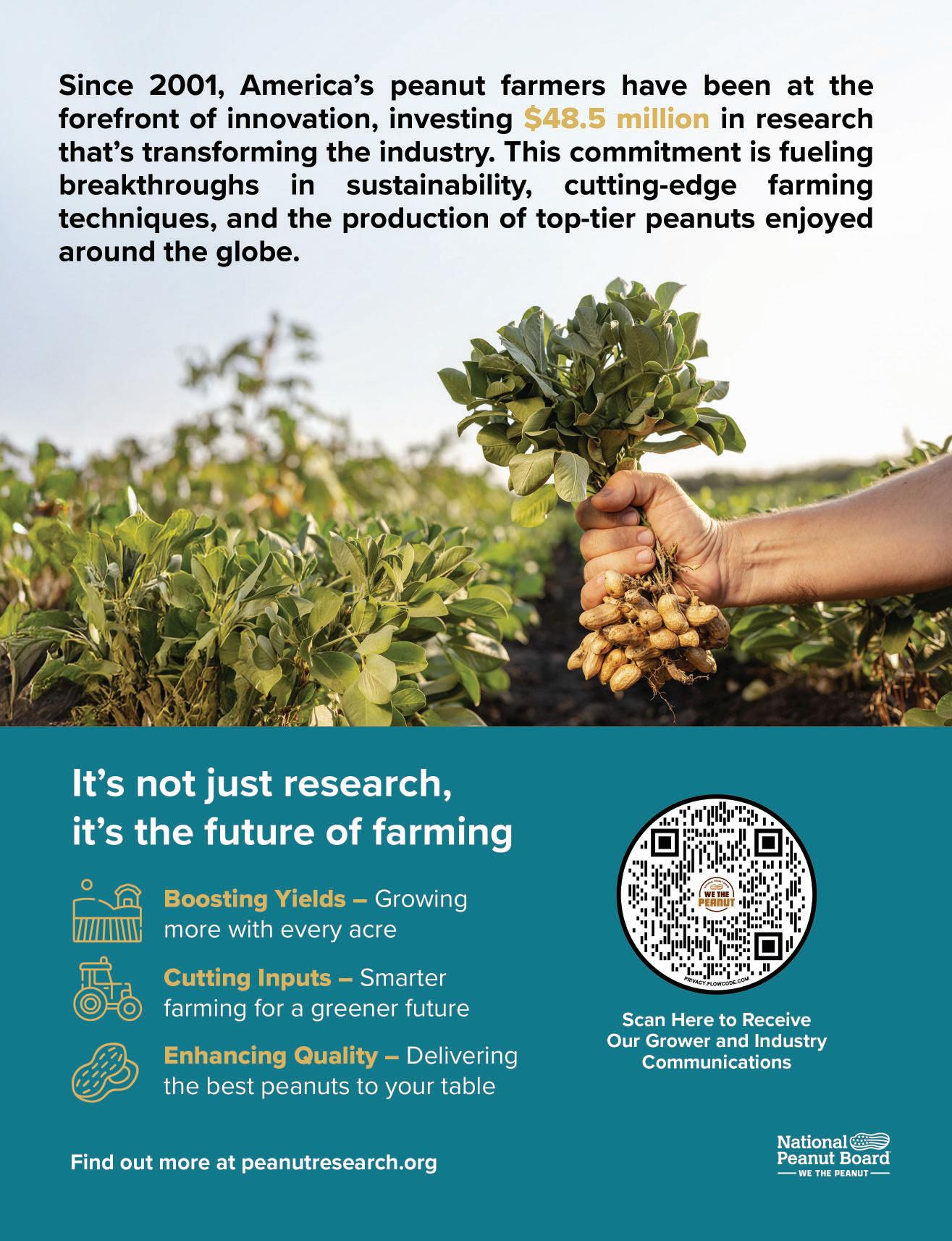
By Joy Crosby
More than 1,500 attendees were able to fine-tune their farming operations with information gained at the 48th annual Georgia Peanut Farm Show and Conference Jan. 16, 2025, at the University of Georgia Tifton Campus Conference Center in Tifton, Georgia. The show is sponsored by the Georgia Peanut Commission.
The one-day show offered farmers a chance to view the products and services of nearly 100 exhibitors and education opportunities. The University of Georgia Peanut Team presented an educational peanut production seminar focusing on the impacts of multiple weather events in 2024 and what to expect in 2025, management of foliage feeders and soil borne insects, history of tropical spiderwort in Georgia and how to manage it, and effects of the expanded season and weather on leafspot management. An industry seed seminar was held, which highlighted peanut varieties available for 2025.
The Georgia Peanut Commission presented awards to individuals and businesses for their service to the peanut industry and promotion of peanuts across the United States. The award recipients include Distinguished Service Award – T.E. Moye Jr., president of Georgia Federal State Inspection Service; Research and Education Award – Tim Brenneman, University of Georgia professor and plant pathologist; and the Media
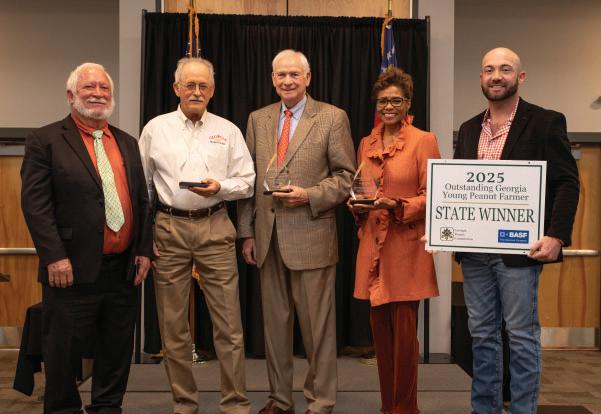
Award – Jim Wallace, retired news anchor for WALB TV.
The Outstanding Georgia Young Peanut Farmer Award, sponsored by the Georgia Peanut Commission and BASF, was presented to Ryan Ireland, Ashburn, Georgia. The award is presented to one Georgia peanut farmer based upon the applicant’s overall farm operation; environmental and stewardship practices; and leadership and community service activities. Ireland grows peanuts, cotton, corn, wheat, hay and cattle.
Ireland strives to incorporate new and innovative ways to increase yields and be a natural steward of the land. Ireland chooses to focus on water retention, disease control and overall soil quality.
In addition to the Outstanding Georgia Young Peanut Farmer Award, the Georgia Peanut Commission and Agri Supply presented the Outstanding Georgia Peanut Farmers of the Year Award to individuals representing each of the commission’s five districts. The GPC board members started this award to honor farmers who have the passion, diligence, leadership and desire to see the peanut industry in the state of Georgia continue to be the highest quality. Winners include District 1 – Martine

Phillips, Colquitt; District 2 – Billy Senkbeil, Sylvester; District 3 – Daniel Johnson, Alma; District 4 – Wayne Peavy, Vienna; and District 5 – Sauls Partnership, Shellman. These farmers received a sign to display at their farm and gift cards from Agri Supply and the Georgia Peanut Commission.
At the close of the day, the presentation of the Grand Door Prize donated by Kelley Manufacturing Co. was presented to Robb Lane, Omaha, Georgia. Lane received one season’s use of a new KMC peanut combine and the option of purchasing the combine from a KMC dealer with $15,000 off the list price at the end of the 2025 season, as well as a cash prize.
Amadas Industries also provided the Grower Door Prize to Melissa Williams of Lenox, Georgia, and Joey Williams, Lenox, Georgia. Melissa Williams received a customized Grizzly cooler and a certificate towards the purchase of a new Amadas selfpropelled peanut combine, pull-type peanut combine, peanut digger or peanut dump cart. Joey Williams received a customized Grizzly cooler and a certificate for Amadas parts.
For photos and additional information on the Georgia Peanut Farm Show and Conference, visit the Georgia Peanut Commission website at www.gapeanuts.com.
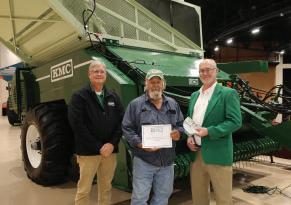
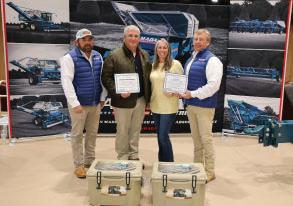
Door
to Robb Lane, Omaha, Ga., during the Georgia Peanut Farm
Lane received one season’s use of a new KMC peanut combine and the option of purchasing the combine from a KMC dealer with a $15,000 off the list price at the end of the 2025 season, as well as a cash prize.
and
Ga., during the Georgia Peanut
Show. Williams received a customized Grizzly cooler and a certificate towards the purchase of a new Amadas self-propelled peanut combine, pull-type peanut combine, peanut digger or peanut dump cart or parts.
The Georgia Peanut Commission is seeking candidates for the position of executive director. The GPC Board of Directors seek candidates to oversee the management of Commission resources and serve as the staff team leader. During the recent Georgia Peanut Farm Show, Don Koehler, current GPC executive director, announced his plans to retire Aug. 1, 2026.
Ideal candidates will be energetic leaders with experience in agriculture. This position operates in a high-pressure environment and requires a great deal of commitment of time on the part of the individual. It is also a very diverse position which requires an individual with broad vision to truly lead. It requires a combination of depth and vision, people skills, management ability, and dedication to the purpose of the Commission.
For more details about the position and job description, please visit the Georgia Peanut Commission’s website at gapeanuts.com/executivedirector.
By Robert L. Redding Jr.

The United States Peanut Federation applauds Congress for including agricultural economic assistance and disaster assistance in the final passage of the Fiscal Year 2025 (FY25) appropriations legislation. After much deliberation, on December 20, 2024, the U.S. House of Representatives passed H.R. 10545 by a vote of 366-34, which included a continuing resolution for FY25 appropriations funding, a one-year extension of the 2018 Farm Bill, $10 billion in agricultural economic assistance, and $21 billion in agricultural disaster assistance. The U.S. Senate passed H.R. 10545 overnight by a vote of 85-11, and President Biden signed the bill into law later December 21, 2024.
Due to the multi-year impact of increased costs of production, low commodity prices, and recent natural disasters, peanut growers
are struggling, and many will have difficulty financing their crop for 2025. For many peanut producers, the inclusion of these agricultural assistance provisions in the final legislation will determine whether they continue farming in 2025. USPF leaders are grateful to the peanut state members of Congress and other congressional agricultural leaders who worked tirelessly to ensure these vital initiatives were secured in the final passage of the appropriations bill.
Moving into the new year, peanut producers can expect to receive an estimated economic assistance payment of $76.30 per acre no later than 90 days after the bill is enacted, according to peanut economist Stanley Fletcher.
"We once again would like to extend our gratitude to all of our representatives who stayed steadfast
in passing a resolution that would ensure our farmers can continue doing what they do so well- providing this country with the best possible food security in the world," says Jamie Brown, USPF chairman. "We are thankful that they listened to so many who expressed the challenges that are being faced and have offered an opportunity to meet those challenges in the years to come."
"After a few long, hard years for peanut farmers who were unsure if they would be able to continue farming in 2025, we are grateful to Congress for passing muchneeded financial assistance," says Joe Boddiford, Georgia Peanut Commission chairman. "Thank you to the members of Congress who worked hard to ensure our farmers would receive relief. It's a great day for families in rural America who work tirelessly to feed our nation."
The American Peanut Shellers Association, National Peanut Buying Points Association, Southern Peanut Farmers Federation, and United States Peanut Federation recently hosted an Aflatoxin Research Update at the University of Georgia Conference Center in Tifton, Georgia.
Throughout the day, 18 presentations were given by research leaders from the U.S. Department of Agriculture's National Peanut Research Lab, research and extension professionals from land grant universities such as Fort Valley State University, University of Georgia, University of Florida, and Mississippi State University.
"The entire peanut supply chain benefits from the work these researchers are doing, but most importantly their work will provide
solutions for our farmers," says Courtney Dorsett, chair of the American Peanut Shellers Association Committee on Regulatory Compliance and Research Coordination. "Tackling the aflatoxin problem leads to peanut varieties that are more droughttolerant and resistant to insects and diseases. Maintaining yields with fewer inputs under adverse conditions puts money back in the growers' pockets and ensures that our industry remains sustainable for generations."
The U.S. House Appropriations Committee previously approved the Fiscal Year 2025 Agriculture, Rural Development, Food and Drug Administration, and Related Agencies legislation, which would continue the peanut aflatoxin contamination research funding for FY 2025 at the same $4 million level as FY 2024. This legislation has not yet been passed
and signed into law, but is expected to be finalized late this year or early next year.
"The presentations have underscored the critical need for ongoing research to address the challenges posed by aflatoxin and its impact on the peanut industry," says Chris Chammoun, executive director of American Peanut Shellers Association.
“The funding secured by the United States Peanut Federation has been instrumental in driving these efforts forward, and we are deeply grateful for the support that makes this important work possible.”
The U.S. Peanut Federation will continue to work with USDA, land grant universities and peanut organizations on research, funding, and updates surrounding aflatoxin in peanuts.
U.S. Peanut Federation signs on to letters supporting agricultural tax provisions
The U.S. Peanut Federation recently joined over 260 commodity organizations in sending letters on agricultural tax priorities to U.S. House of Representatives Ways and Means Committee members on the Main Street Tax Team and the Rural America Tax Team.
The letter conveys the importance of supporting various tax provisions that impact the agriculture industry, including maintaining stepped-up basis, estate tax relief, restoring 100 percent bonus depreciation, permanently implementing lower individual tax rates and expanded tax brackets, and permanently establishing the 199A qualified business income deduction.
Additionally, support is urged for maintaining Section 179 expensing, 1031 like-kind exchanges, and the 20 percent capital gains rate.
The letter mentioned, "We write to highlight the critical importance of several business tax provisions that significantly impact farmers, ranchers, landowners and other agricultural businesses across the United States. These provisions, which are not an exhaustive list and are not presented in any priority order, enable these agricultural operations to invest in their futures, maintain competitiveness, and contribute to the nation's food security and economic stability."
U.S. Peanut Federation signs on to letter supporting inputs and pest management tools
The U.S. Peanut Federation signed onto a letter to U.S. Senate Committee on Agriculture, Nutrition, and Forestry Chairwoman Debbie Stabenow and Ranking Member John Boozman, along with U.S. House Committee on Agriculture Chairman GT Thompson and Ranking Member David Scott.
The letter explained how recent discussions have created significant misunderstandings about essential tools such as pesticides and genetic innovations. The signees urged Congressional agriculture leaders to reject any attempts to remove access to pest management technologies, which would make the U.S. more reliant on foreign competitors for food and agricultural goods.
The letter states, “Safe, affordable, and abundant supplies
Secretary of the U.S. Department of Agriculture: Brooke Rollins is from Texas and most recently served as president, CEO, and co-founder of America First Policy Institute.
U.S. Trade Representative: Jamieson Greer, a current partner in international trade at King & Spalding in Washington, D.C., but previously
of agricultural products are essential to the wellbeing of our country. For decades, millions of American farmers and ranchers have dutifully supplied these goods to U.S. consumers. However, without continued access to safe, appropriately regulated agricultural inputs, the ability to supply these vital agriculture products cannot be ensured.”
“Weeds, insects, and fungus outbreaks can inflict significant crop yield losses. They can also infest grazing lands to the point they are unusable for livestock and contribute to wildfire fuel loads. Without continued access to pesticidal tools needed to protect against devastating pests, U.S. farm and ranch operations would quickly become economically unsustainable, jeopardizing our ability to provide affordable food and other agricultural products to consumers.”
Chief of Staff to Robert Lighthizer, President Trump’s former trade representative.
Administrator of the Small Business Administration: Kelly Loeffler of Georgia formerly served in the U.S. Senate, along with other various political and philanthropic involvements.
U.S. Peanut Federation joins on letter to President Trump's Transition Team
The U.S. Peanut Federation recently joined other agricultural groups in sending a letter to President Trump’s transition team to express eagerness to work with the incoming Trump administration to advance nominees who commit themselves to science- and riskbased decision making. Read the full letter below:
“As representatives of the food and agriculture value chain, the undersigned organizations write to express our enthusiasm for working with you and upcoming administration leaders to ensure that America continues to have the safest, most affordable food, feed, and fiber supplies in the world. We are eager to support Administration nominees and appointees who commit to science and risk-based decision making.
Science and risk-based decision making will ensure that policy is factually based and efficient in ensuring consumer health and safety. Our organizations support food and nutrition policies that are based on robust scientific evidence, deliver measurable benefits to consumers, and empower consumers to make informed and healthy purchasing decisions while preventing misunderstanding and confusion.
We stand ready to support the next administration and its efforts to advance safe and affordable food, feed, and fiber supplies.”
U.S. Ambassador to China: David Perdue is a former U.S. Senator and lifelong business executive from Georgia.
Secretary of Veterans Affairs: Doug Collins is an Air Force veteran who previously served in the U.S. House of Representatives representing Georgia 9th congressional district.

Southern Peanut Growers worked with A-1 Broadcast and award-winning Chef Tregaye Wright to put peanut butter front and center on television and radio stations and online outlets nationwide with tips on how to host a holiday gathering.
Chef Tregaye is the host of OWN's Tregaye's Way and winner of Season 12 of Food Network Star. Chef Tregaye reminded viewers how important it is to make a good grocery list before going to the store. Peanut butter is always on her holiday menu because it resonates with people's favorite food and family memories.
She recommended that viewers always plan a few items that can be made ahead like a No Bake Peanut Butter Pie, offer some healthy choices like a Thai Peanut Dip with fresh veggies, and make a candy like Peanut Butter Saltine Brittle which can either be served or packaged to give guests as a gift to take home.
Chef Tregaye did 24 live television and radio interviews hours on Nov. 6,

Southern Peanut Growers exhibited at the New York School Nutrition Association’s Annual Conference in Verona, Oct. 24-25, 2024. New York is one of the top states in terms of students participating in the school nutrition program which put it on the short list for outreach. Attendees were predominately school nutrition directors and buyers. Southern Peanut Growers is following up with a manufacturer who is interested in adding peanut products back to their offerings.
2024, promoting peanut butter, Bush's Baked Beans, Cricut and GE Lighting. The tour resulted in a cumulative audience of 16.1 million with an advertising value of $440,490.
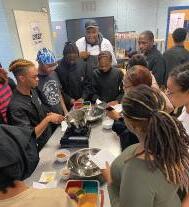
Southern Peanut Growers offers a free turnkey curriculum for culinary instructors which can be downloaded from PeanutButterLovers.com. The curriculum has lesson plans, pre- and postassessments, PowerPoint presentations, and videos. This year, SPG added a replicable guest chef portion where a local chef presents information on peanuts, on entering the culinary profession, and then works with students to make peanut sauces from around the world to showcase the versatility of peanuts and peanut butter. Students receive a passport with peanut information and the recipes to keep. The program was delivered by Chef Duane Nutter, chef/ owner of Southern National in Atlanta, to three high schools in DeKalb County in December and has two more scheduled in January.
Southern Peanut Growers is part of national effort by peanut growers to work with K-12 schools across the country to provide information on managing food allergies in schools and return peanuts to the school nutrition program if they have a current peanut ban in place.
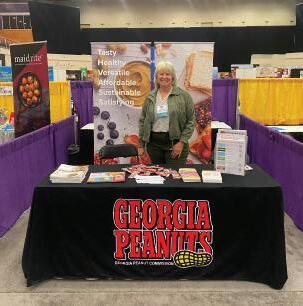
Leslie Wagner, Southern Peanut Growers executive director, promotes peanuts at the exhibit during the New York School Nutrition Association's annual conferencets as part of the national effort by peanut growers to work with K-12 schools across the country.

